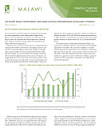Credit constraints and agricultural technology adoption: Evidence from Nigeria
Despre această carte electronică
The results show that about 27 percent of survey households were found to be credit constrained – 12.8 percent due to supply-side factors and 14.2 percent due to demand-side factors. Lack of access to information and communication technology, extension services, and insurance coverage are the major demand-side factors negatively affecting smallholder’s access to credit. Registered land tiles and livestock ownership enhance credit access. Credit constraints manifests themselves differentially on the adoption of different agricultural technologies. While adoption of inorganic fertilizer and improved seed are significantly affected by credit constraints from both the supply and the demand-sides; use of agricultural machinery is affected only by demand-side factors, while use of agrochemicals is not affected from either supply or demand-side credit factors. From a policy perspective, our findings indicate that improving credit access via supply-side interventions alone may not necessarily boost use of modern agricultural technologies by smallholder farmers in Nigeria. Demand-side factors, such as access to information, extension services, and insurance cover, should equally be addressed to mitigate the credit constraints faced by smallholders and increase their adoption of modern agricultural technologies and improve their productivity.










